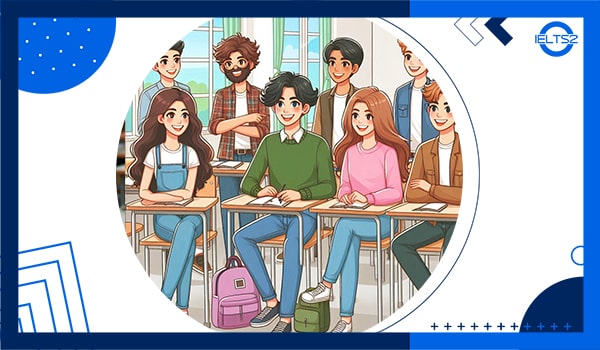رایتینگ آیلتس موضوع یک زبان جهانی برای ارتباطات بینالمللی
IELTS band 9 Essay a new language for international communication
یک نمونه رایتینگ Task 2 آیلتس در سطح نمره 9 درباره موضوع “زبان جهانی برای ارتباطات بینالمللی ” را با هم میبینیم. این سمپل از نوع advantages of this outweigh the disadvantages است که در آن از نویسنده درخواست میشود مزیت ها و معایب یک موضوع را با هم بررسی کرند. در اینجا این رایتینگ به همراه بررسی و تحلیل ساختارهای گرامری پیشرفته و ترکیب لغات و فرمت رعایت شده در آن برای رسیدن به این نمره ارایه میشود. همچنین عزیزان میتوانند از تاپیک “زبان جهانی برای ارتباطات بینالمللی ” بعنوان یک موضوع لکچر جذاب و جدید یا موضوع رایتینگ پیشرفته انگلیسی استفاده نمایند. 500 سمپل از جدیدترین موضوعات رایتینگ آیلتس (سال 1403) با جواب نمره 9 پیشنهاد بعدی ما به شما عزیزان است.
توضیح کلی درباره موضوع زبان جهانی برای ارتباطات بینالمللی
در دنیای امروز که ارتباطات بینالمللی اهمیت بسیاری دارد، بحث بر سر ایجاد یک زبان جهانی جدید برای تسهیل این ارتباطات داغ است. برخی معتقدند که زبان واحد میتواند موانع زبانی را برطرف کرده و موجب تعامل بهتر بین فرهنگها و کشورهای مختلف شود. این زبان میتواند تجارت، دیپلماسی و علم را بهبود بخشد و از نیاز به ترجمه و تفسیر بکاهد. با این حال، ایجاد و پذیرفته شدن یک زبان جدید در سطح جهانی چالشهای فراوانی دارد، از جمله احتمال تهدید زبانها و فرهنگهای محلی. برخی افراد معتقدند که این ایده باعث از بین رفتن تنوع فرهنگی میشود و ممکن است مقاومتهای زیادی را در بر داشته باشد. بنابراین، ارزیابی مزایا و معایب این ایده به تصمیمگیری دقیقتری کمک میکند.
سوال تسک 2 رایتینگ آیلتس با نمونه پاسخ نمره 8 تاپیک زبان جهانی برای ارتباطات بینالمللی
Some believe that we should invent a new language for international communication.
Do the advantages of this outweigh the disadvantages?
The debate surrounding the relative merits of competition and cooperation in child development has persisted for decades. While some argue that fostering a sense of competition is vital for cultivating ambition and resilience, others believe that teaching children to cooperate enhances social harmony and interpersonal skills. In my opinion, a balanced integration of both approaches is essential for preparing children for the multifaceted challenges of adult life.
On the one hand, encouraging competition can inspire children to strive for excellence. By participating in competitive activities, children learn to set goals, persevere through challenges, and develop a strong work ethic. For instance, academic competitions, such as science fairs or math contests, push students to expand their knowledge and hone their problem-solving abilities. Furthermore, the competitive spirit often motivates individuals to surpass their previous achievements, fostering a lifelong commitment to self-improvement. However, excessive emphasis on competition may lead to unhealthy comparisons, stress, and a fear of failure, which can adversely impact a child’s mental health.
On the other hand, cooperation cultivates essential social and emotional skills that are indispensable in today’s interconnected world. Collaborative activities, such as group projects or team sports, teach children the value of teamwork, empathy, and effective communication. These experiences help them build relationships and navigate conflicts constructively, preparing them for cooperative roles in their personal and professional lives. Nevertheless, prioritizing cooperation without exposing children to competition might limit their ability to handle rivalry or assert their individuality in competitive settings.
In my view, the most effective approach combines both competition and cooperation. Schools and parents should design activities that blend these elements, such as group competitions where teams must collaborate to achieve success. This approach ensures that children reap the benefits of both systems—developing ambition and resilience while also cultivating empathy and teamwork. By striking this balance, children can grow into adaptable, well-rounded adults capable of excelling in various domains.
In conclusion, while competition nurtures ambition and self-discipline, cooperation fosters social cohesion and emotional intelligence. A hybrid strategy that integrates these approaches equips children with a comprehensive skill set, enabling them to thrive in the dynamic and competitive environments of the modern world.
5 واژه آکادمیک (به همراه معنی، تلفظ، و مثالها) برای سمپل زبان جهانی برای ارتباطات بینالمللی
- Sense of competition
تلفظ: /sɛns əv ˌkɒmpɪˈtɪʃən/
معنی: حس رقابت
مثال: A sense of competition often drives children to set higher goals for themselves.
ترجمه: حس رقابت اغلب باعث میشود کودکان اهداف بالاتری برای خود تعیین کنند. - Resilience
تلفظ: /rɪˈzɪliəns/
معنی: تابآوری
مثال: Resilience is a key trait developed through competitive experiences.
ترجمه: تابآوری یک ویژگی کلیدی است که از طریق تجربیات رقابتی پرورش مییابد. - Interpersonal skills
تلفظ: /ˌɪntərˈpɜːrsənl skɪlz/
معنی: مهارتهای بینفردی
مثال: Cooperative activities help children improve their interpersonal skills.
ترجمه: فعالیتهای گروهی به کودکان کمک میکند مهارتهای بینفردی خود را بهبود دهند. - Multifaceted
تلفظ: /ˌmʌltɪˈfæsɪtɪd/
معنی: چندوجهی یا متنوع
مثال: Preparing children for adulthood requires a multifaceted approach.
ترجمه: آماده کردن کودکان برای بزرگسالی به یک رویکرد چندوجهی نیاز دارد. - Cohesion
تلفظ: /kəʊˈhiːʒən/
معنی: انسجام
مثال: Cooperation fosters cohesion among peers, reducing conflicts.
ترجمه: همکاری انسجام بین همسالان را تقویت کرده و درگیریها را کاهش میدهد.
5 ساختار گرامری پیشرفته
- وابستههای قیدی (Adverbial Clauses)
- مثال: While competition drives self-improvement, cooperation enhances social skills.
- توضیح: این ساختار به مقایسه یا تضاد بین دو ایده کمک میکند و متن را روانتر میسازد.
- اسمسازی (Nominalization)
- مثال: The prioritization of cooperation over competition can limit individual ambition.
- توضیح: استفاده از اسمسازی باعث میشود متن رسمیتر و مناسبتر برای سبک آکادمیک باشد.
- ساختار شرطی نوع دوم
- مثال: If children are exposed only to cooperation, they might lack the drive to compete.
- توضیح: شرطی نوع دوم برای بحث در مورد شرایط فرضی یا پیامدها استفاده شده است.
- ساختار موازی (Parallel Structure)
- مثال: Children can develop ambition, resilience, and empathy through a balanced approach.
- توضیح: استفاده از ساختار موازی باعث تأکید و افزایش انسجام متن میشود.
- جملات مجهول (Passive Voice)
- مثال: Skills such as teamwork and communication are cultivated through cooperative activities.
- توضیح: جملات مجهول بر پیامدها و نتایج تمرکز دارند، نه بر فاعل.
فرمت رایتینگ و موارد رعایت شده برای نمره 9
- مقدمه (Introduction):
- موضوع به وضوح معرفی شده و دیدگاه کلی بیان شده است.
- پاراگرافهای اصلی (Body Paragraphs):
- هر پاراگراف به یکی از دو دیدگاه پرداخته و دیدگاه شخصی در پاراگراف سوم آورده شده است.
- نتیجهگیری (Conclusion):
- بحث به صورت مختصر جمعبندی شده و راهحل پیشنهادی ارائه شده است.
- واژگان و ساختارهای متنوع:
- واژگان آکادمیک و ساختارهای گرامری پیچیده به کار رفتهاند.
- انسجام و پیوستگی:
- استفاده از عبارات ربطدهنده مثل on the one hand, while, و in conclusion باعث جریان منطقی متن شده است.
این متن تمامی معیارهای یک رایتینگ نمره 9 را برآورده میکند، از جمله انسجام، واژگان گسترده، و تنوع ساختاری.
سمپل های بیشتر و تصحیح رایگان رایتینگ
100 نمونه رایتینگ آیلتس پیشنهاد آخر ما به دوستان گرامی هست. این نمونه رایتینگ های تسک 2 آیلتس درباره موضوعات پرتکرار رایتینگ آیلتس و همچنین جدیدترین موضوعات می باشند که توسط یکی از سایت های معتبر انگلیسی زبان فعال در حوزه آیلتس تنظیم شده راست. همچنین برای تصحیح رایگان رایتینگ آیلتس در کانال تلگرام رایتینگ ما همراه باشید و به ادمین برای تصحیح رایتینگ اطلاع دهید.







